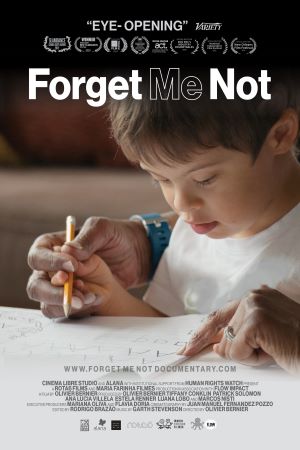
Forget Me Not: Inclusion in the Classroom 2021
Distributed by Cinema Libre Studio, 120 S. Victory Blvd, First Floor, Burbank, CA 91502, 818-588-3033
Produced by Olivier Bernier, Tiffany Conklin, Patrick Solomon, Ana Lucia Villela, Estela Renner, Luana Lobo, and Marcos Nisti
Directed by Olivier Bernier
Streaming, 103 mins
College - General Adult
Disabilities; Special education
Date Entered: 12/09/2022
Reviewed by Mary Kamela, Student Support and Engagement Librarian, University at BuffaloForget Me Not follows filmmaker Olivier Bernier, his wife Hilda, and their son Emilio, who has Down Syndrome, as they attempt to navigate special education in the New York City public schools. With footage beginning at Emilio’s birth, viewers watch him grow up, first at home with nurturing parents and early intervention supports from the NYC Department of Health. Before Emilio’s third birthday, his parents must begin the process of finding him placement into a New York City public preschool. This involves many belabored processes, including choosing an evaluation site, attending evaluations, and taking part in IEP meetings. Each step of the way, the Bernier’s encounter issues, including a lack of communication and seeming unconcern from the NYC Department of Education.
Education law states that students with disabilities should be placed into the least restrictive environment (LRE), such as an inclusive classroom, first, and only moved to a segregated special education classroom when the initial placement is not working for the student. Viewers soon learn, however, that this does not always happen. The documentary paints a picture in which families are subject to the decisions of the NYC Department of Education with little ability to sway the decision or advocate for alternative placements.
In addition to Emilio’s story, others in similar situations share their experience in vignettes; there is Wesley, who was essentially forced out of his inclusive classroom after school administration changed, and Aiden, a sixteen-year-old with Down Syndrome whose family is taking legal action after Aiden was not allowed to attend his local middle school. The Bernier’s meet with these families and attend advocacy events, such as the United Nations Headquarters Conference on Inclusive Education. A thriving, inclusive K-12 public school in Boston, the Henderson School, is highlighted as a success story in inclusive education, and viewers also see Sabrina, a student with Down Syndrome who dreams of becoming a professor, succeeding in higher education at the College of New Jersey.
Forget Me Not paints a clear picture of the problems with special education in New York, past and present. The film includes historical discussions and archival footage of shuttered institutions like Letchworth Village and Willowbrook, as well as interviews with current NYC public school faculty who describe the segregation that current students, especially those with intellectual disabilities face. These can include separate doors for entry, separate mealtimes from other students, and no public signage for special education programs. For those not well-versed in education terminology, the film includes definitions of subject-specific vocabulary onscreen, such as ‘due process’ and ‘IEP.’
The film is highly recommended for college students, graduate students, and practitioners in education. In addition to its main narrative of the Bernier’s journey, the film provides important historical context and relevant case studies of problems and successes in inclusive education.
Awards:Slamdance Grand Jury Award 2022; Middlebury New Filmmakers Festival Hernandez/Bayliss Prize for Triumph of the Human Spirit Award 2021
Published and licensed under the Creative Commons Attribution 4.0 license. Anyone can use these reviews, so long as they comply with the terms of the license.